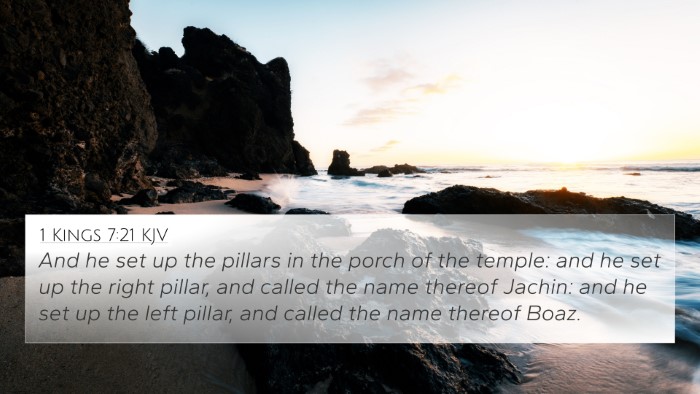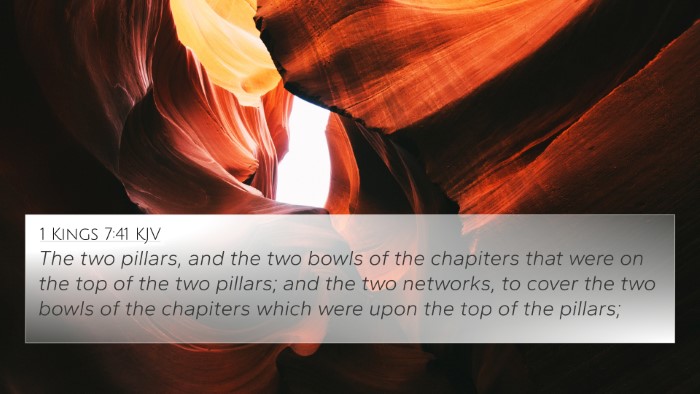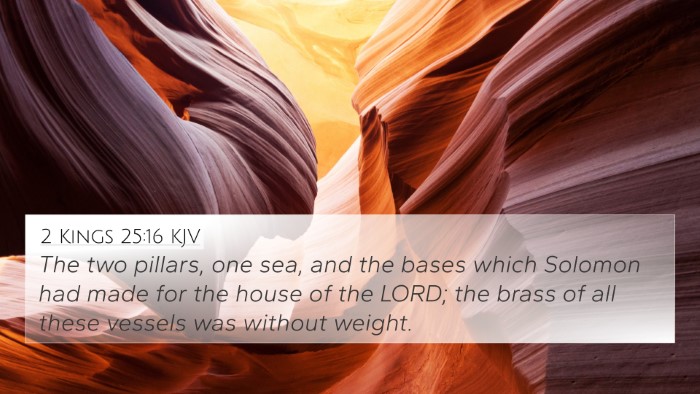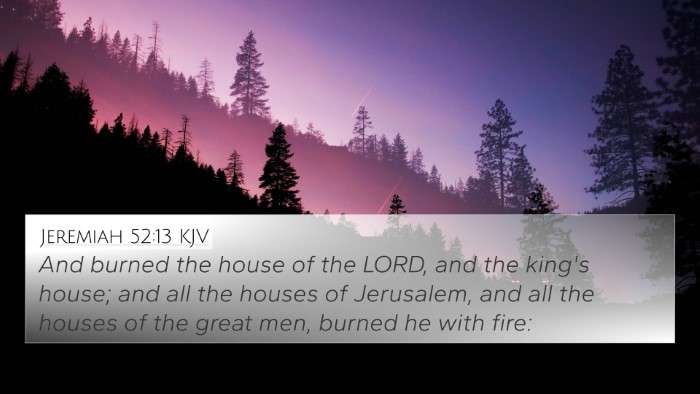1 Kings 7:15 - Analysis and Interpretation
Verse: "For he cast two pillars of brass, eighteen cubits high apiece: and a line of twelve cubits did compass either of them about." (1 Kings 7:15)
Comprehensive Overview
The construction of King Solomon's temple is a pivotal moment in biblical history, and 1 Kings 7:15 specifically provides insight into the details of the temple's architecture. This verse describes the creation of two substantial bronze pillars that adorned the temple's entrance, reflecting both skill and significance in their design.
Symbolism of the Pillars
Matthew Henry emphasizes that the pillars represent strength and stability in the spiritual realm. Brass, being a strong metal, symbolizes divine strength. These pillars could also indicate God's presence—supporting the structure of worship and establishing a point of connection between heaven and earth.
Albert Barnes adds that the precision in the measurements highlights the importance of order and beauty in approaching God. The height of eighteen cubits and their circumference of twelve cubits suggest a grand design intended to awe the onlookers and invoke reverence.
Adam Clarke notes the architectural prowess required to forge such large and detailed pillars, drawing attention to the craftsmen's skill and the resources entrusted to them. It also hints at Solomon's wealth and the communal effort that went into building a place worthy of the Lord's name.
Connections Between Bible Verses
- 2 Chronicles 3:15 - "Also he made before the house two pillars of thirty and five cubits high, and the chapter of that was upon the top of it was five cubits." This verse mirrors 1 Kings 7:15 as it discusses the scale and grandeur of the pillars.
- Jeremiah 52:21 - "And concerning the pillars, the height of one pillar was eighteen cubits..." This verse reinforces the dimensions mentioned in Kings, providing a detailed description of these pillars.
- Revelation 3:12 - "Him that overcometh will I make a pillar in the temple of my God..." This New Testament reference draws a parallel between the physical pillars of the temple and the spiritual pillars in God's kingdom, symbolizing strength and fidelity.
- 1 Corinthians 3:16 - "Know ye not that ye are the temple of God, and that the Spirit of God dwelleth in you?" This verse relates to the theme of the temple as a dwelling place for God, akin to the purpose of the pillars.
- Galatians 2:9 - "And when James, Cephas, and John, who seemed to be pillars, perceived the grace that was given unto me..." The use of 'pillars' here metaphorically connects to strong leaders in the early Church, reminiscent of the physical pillars in the temple.
- Isaiah 54:11-12 - "O thou afflicted, tossed with tempests, and not comforted! Behold, I will lay thy stones with fair colors, and lay thy foundations with sapphires." This reflects a spiritual understanding of God's promise and structure, resonant with the temple's physical foundation.
- Hebrews 9:24 - "For Christ is not entered into the holy places made with hands, which are the figures of the true; but into heaven itself, now to appear in the presence of God for us." This verse underscores the transition of God's dwelling from a physical temple to a spiritual one.
Thematic Connections
The themes arising from 1 Kings 7:15 can be explored through a lens of architectural beauty, divine presence, and the transcendent connection between God and His people. The grandeur of the pillars points to the importance of the temple as a symbol of divine communion and worship, which invites readers to consider how physical structures in Scripture often encapsulate spiritual truths.
Cross-Referencing Biblical Texts
Utilizing tools for Bible cross-referencing enhances understanding of verses like 1 Kings 7:15. A Bible concordance or cross-reference guide can reveal related passages to broaden one's study. Not only does this method illuminate thematic connections but it also promotes a deeper engagement with Scripture.
Conclusion
In summary, 1 Kings 7:15 serves as a rich source for understanding both the physical and spiritual significance of the temple's pillars. By examining connections between this verse and others, readers can appreciate the multifaceted symbolism of divine strength, the importance of worship architecture, and the ongoing presence of God within the lives of believers.
Additional Insights and Tools
For those seeking to deepen their study, consider utilizing comprehensive Bible cross-reference materials and resources. Engaging in a comparative Bible verse analysis not only enriches one’s knowledge but also fosters an appreciation for the interwoven narratives of Scripture.
Call to Action
As you delve into the Word, consider the surrounding verses that support and elaborate on 1 Kings 7:15. How do these scriptures relate to the themes of strength, divine presence, and worship in your own life? Embrace the journey of discovering the intricate links between these biblical texts and allow them to inspire and transform your understanding of God's word.









